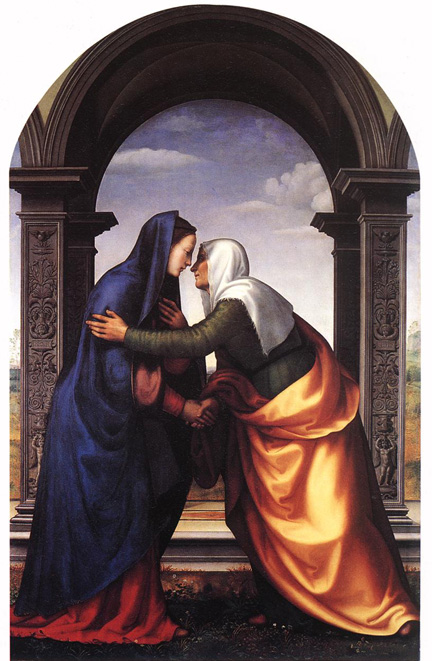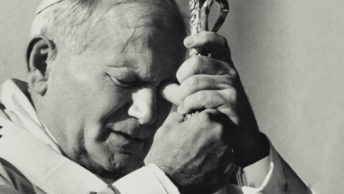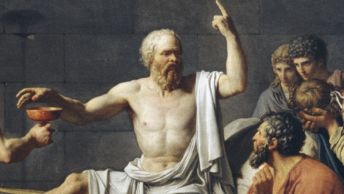
During the month of June, the Church celebrates the Visitation of the Blessed Virgin Mary. For many of us, the story of Mary’s visit with her cousin Elizabeth is well known. To make this visit, we are informed that our Blessed Mother traveled across mountainous terrain to reach a town called Hebron, in order that she might wait upon her cousin Elizabeth. And with Elizabeth carrying the prophet who would boldly declare to all, “Behold, the Lamb of God, who takes away the sin of the world,” their meeting was to be about more than just kinship. For in the divine plan, the yet-to-be born John the Baptist is said to have leaped in Elizabeth’s womb as Mary, carrying the Divine Child within her, came into his presence. We can only imagine the impact this visit had upon John and his future mission. And perhaps the same can be said about you and me, as we continue to build our relationship with the Lord.
As Catholics, our participation in the Eucharist provides us with a unique and privileged relationship with the Lord. Having received the Body and Blood of Christ, we are given a mission: to be bread for the world in order that we might help change, confect, and transform it. Indeed, each of us is called to be Jesus’ eyes, ears, legs, and arms and challenged to make the light of Christ present in sometimes difficult and uncomfortable circumstances.
While certainly not the intention of America’s Founding Fathers, our current culture has come to preach a unique “sacrament” in which we are told that the Church is to have no influence over the State. After all, “one’s faith is a private matter, to be kept secretly compartmentalized within our hearts.” Likewise, a person’s conscience, which presumably has been formed by faith and reason, is to be severed completely from the legislative process. Never should it inform one’s vote in the public arena. For if it did, “ancient and outmoded” structures such as the Catholic Church would be seen as indirectly imposing it’s values upon the enlightened masses which, if truth be told, wish she did not exist.
As many of you are aware, the Republican-controlled N.Y. State Senate voted in favor of “same sex” marriage by a margin of 33-29, a measure quickly signed into law by the Catholic governor of New York. Afterwards, the bishops of New York, led by Archbishop Timothy Dolan, issued a formal statement:
“We worry that both marriage and the family will be undermined by this tragic presumption of government in passing this legislation that attempts to redefine these cornerstones of civilization.”
For me, however, the most interesting observation came not from the bishops; but rather from one of the so-called Catholic legislators who had voted in favor of this groundbreaking measure. Having been one of the undecided votes, Senator Mark Grisanti rationalized his decision in support of the new law:
“As a Catholic I was raised to believe that marriage is between a woman,” he told the Senate, but added that after doing months of “research,” he had decided, “I cannot legally come up with an argument against same-sex marriage. Who am I to say that someone does not have the same rights that I have with my wife?”
While not an elected representative, my research into the topic reveals this definition of marriage:
“The matrimonial covenant, by which a man and a woman establish between themselves a partnership of the whole of life and which is ordered by its nature to the good of the spouses and the procreation and education of offspring, has been raised by Christ the Lord to the dignity of a sacrament between the baptized.”
And while this definition comes from the Code of Canon Law (1055.1), I would venture to say that if one were to strip off the latter references to Christ, sacrament, and the baptized, we would have arrived at a definition for which Gallup pollsters would have consistently found “acceptance” by large majorities throughout the ages.
In the end, however, if “enlightened” and raw legislative fiat continue to make non sequiturs the law of the land, watch out. For as the lyrics from the 1970s rock band, Bachman Turner Overdrive, remind us— “You ain’t seen nothing yet.”









One wonders if Senator Grisanti could find a "legal" reason to prevent a man from marrying three or four women at one time, or a man marrying a six-year-old girl, or a mother marrying her son. I cringe every time a politician begins a sentence with "As a Catholic . . . " What always follows is a view that is contrary to Catholic teaching. Senator, you may call yourself a Catholic if you wish, but if you dissent from Church teaching, you're not one.